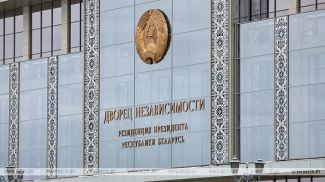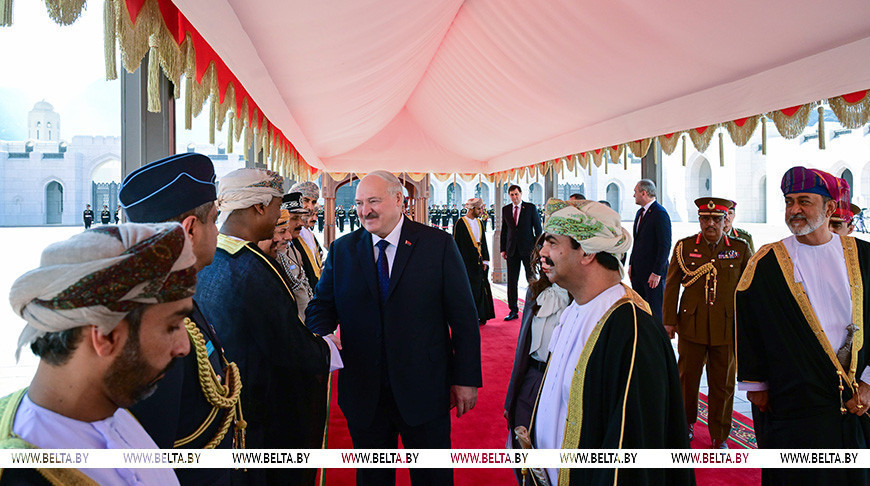
News of the story
"After the Fact: Lukashenko’s Decisions"
Today, many states are trying to make friends or gain influence over the countries of the Middle East. The reasons are really simple: it is more reliable, profitable and safer to be friends against someone else. But relations do not have to be a zero-sum game, but a win-win. Aleksandr Lukashenko's visit to Oman showed that this is exactly the principle that the truly strong powers adhere to. In the new episode of BelTA’s YouTube project ‘After the Fact: Lukashenko’s Decisions” we will tell you why Belarus is strengthening its presence in the Middle East and what things truly unite Minsk and Muscat. Why were the talks between the Belarusian president and the Sultan of Oman closed to the public and what agreements were reached behind closed doors? What did the Belarusian president write about in an article for an Omani newspaper and what surprise awaited him at the Oman National Museum.
When did Belarus begin to develop relations with Oman?
Belarus has long-standing ties with Oman: diplomatic relations between our countries were established more than 30 years ago. Aleksandr Lukashenko made the first visit to Muscat more than 17 years ago
While in 2007 the countries faced the task of creating a solid regulatory framework for the development of trade and economic relations, today Belarus and Oman are thrashing out the strategy and tactics of bilateral cooperation.
Minsk views Muscat as one of the promising trade and investment partners in the Gulf region. This has been facilitated by the intensification of official contacts at the governmental and parliamentary levels over the past two years. Belarus is committed to developing relations with Oman in all areas. All the more so as the states enjoy a high level of trust and sincere friendship.
In 2016 at a meeting with Oman business community Aleksandr Lukashenko noted that the potential of our economic cooperation is huge and will be in demand.
“Belarus is a highly developed country with the economy based on machine building, among other things. In this regard, we are ready to both supply machinery to Oman and set up joint ventures in its territory. Investment cooperation holds a great promise. Belarus has the most favorable conditions for doing business: we guarantee the protection of private property and investments and ensure the right to repatriation of profits. We do not create any obstacles to any mutually beneficial joint projects,” the head of state said.
Sergei Rachkov, Chairman of the Standing Committee on International Affairs of the House of Representatives, former Ambassador to Egypt and concurrently to Oman (2014-2019), said that the Belarus-Oman ties relay on friendly personal relations between the leaders.
“The country is very interesting, beautiful with very nice people. So the cooperation has always had prospects. We have done something already to promote it but there is more to be done,” the MP said.
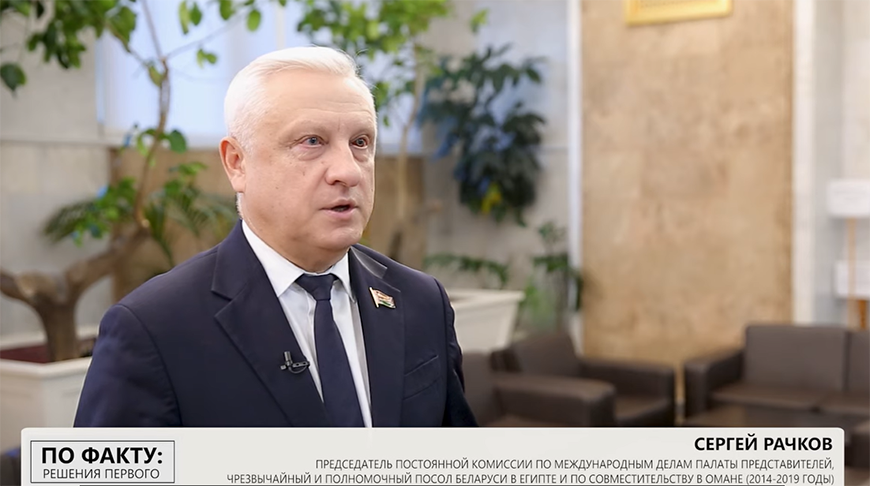
But Omanis have their own distinctive feature - they are a tolerant and peace-loving nation that seeks to build good relations with its neighbors and other countries in the region, which, however, raises a few eyebrows in the region. There is one more important nuance. Although oil, petroleum products and gas make up the vast majority of Oman's exports today, the country has limited reserves of these minerals. Oman is therefore seeking to seriously diversify and modernize its economy. Political elites here realize that, as they say, not by oil alone.
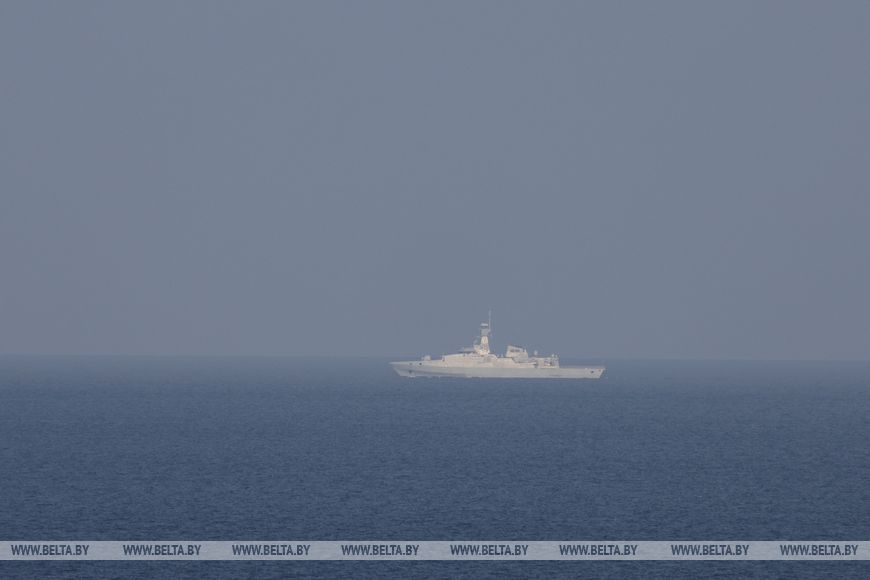
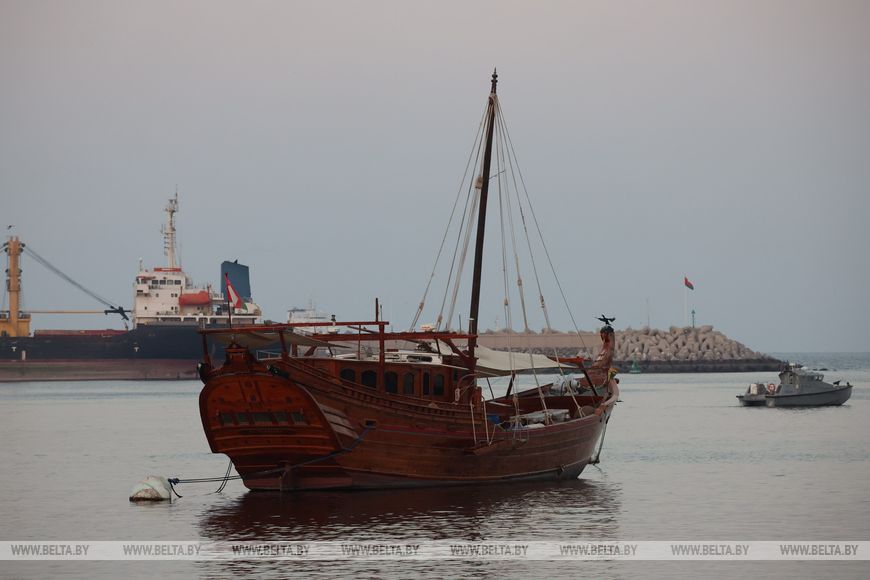
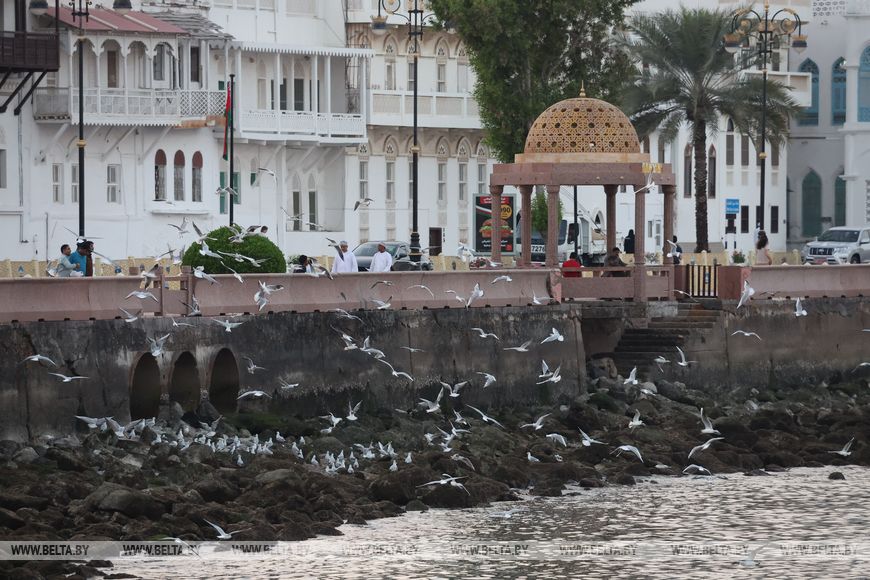
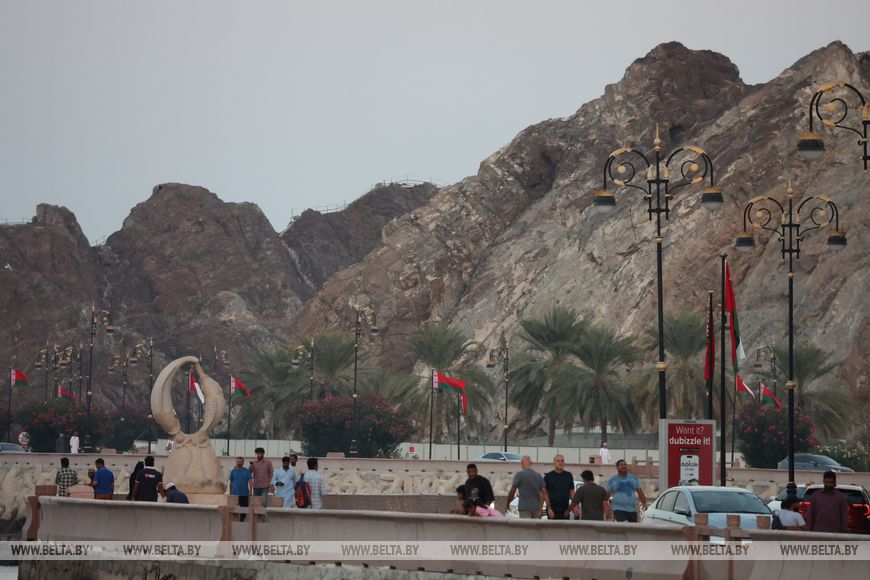
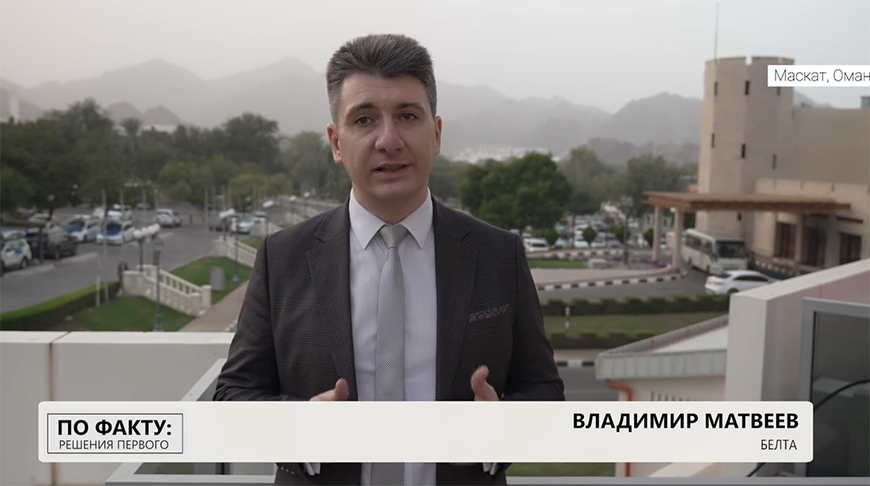
The Belarusian ministers, who left the conference hall after the expanded-format talks, did not hide their optimism. Belarusian Minister of Foreign Affairs Maksim Ryzhenkov said that Oman signaled readiness to build long-term relations with Belarus. According to him, Belarus views Oman as a state that has been a trade hub throughout its thousand-year history, a country that has maintained relations with the entire region,
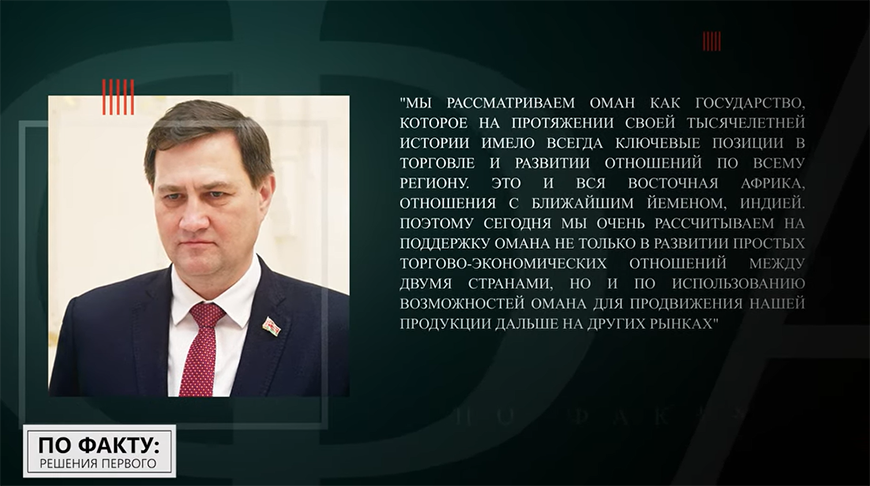
“This is East Africa, neighbor Yemen, as well as India. Therefore, today Belarus counts on Oman's interest in boosting bilateral trade and economic relations, and, most importantly, it would like to use Oman's capacities in order to sell our products further in other markets. All prerequisites are in place for this,” Maksim Ryzhenkov said.
Belarus' Industry Minister Aleksandr Yefimov admitted that the trade between Belarus and Oman is very low. Oman is interested in Belarusian passenger vehicles, trucks, road construction machinery, utility vehicles and agricultural machines.
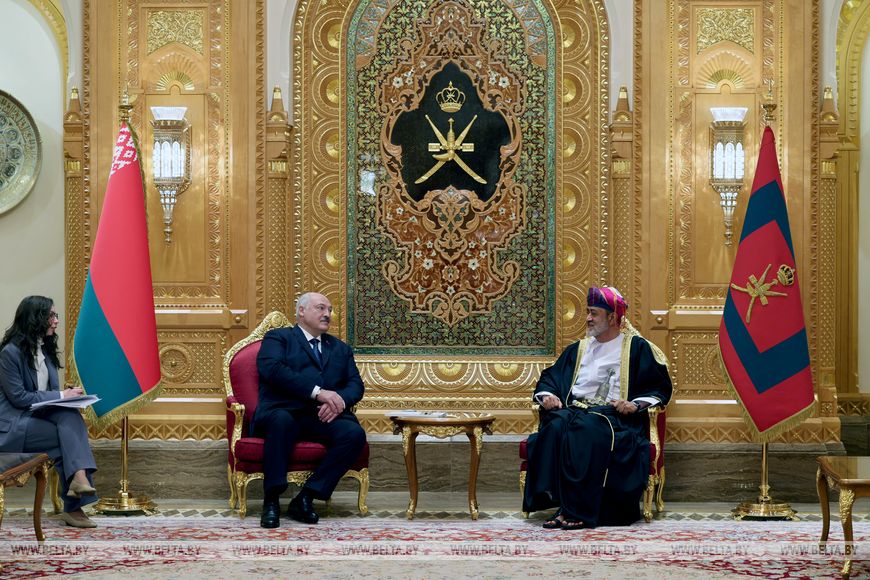
When the evening set in, the leaders of Belarus and Oman continued their communication and exchanged gifts. Aleksandr Lukashenko presented the Sultan with a Slutsk sash and a Shpagin submachine gun. Long wide sashes with a beautiful pattern and precious threads interwoven into them were first made in the Belarusian lands back in the 16th century. Such a sash indicated the noble origin of its owner and was considered a status symbol.
As for the legendary Shpagin submachine gun, this weapon played a role in the liberation of Belarus from the Nazi invaders and, in general, in winning the Great Patriotic War. The PPSh submachine gun was the main infantry weapon, and soldiers and partisans respectfully called it Papasha.
In turn, the Sultan gifted the Belarusian leader a khanjar, a traditional dagger originating from the Sultanate of Oman. This curved dagger is a mandatory item of traditional Omani Arab costume, and a symbol of the country. One more interesting detail: Aleksandr Lukashenko gave the Sultan a coin in return - there is such a tradition when you accept a cold weapon as a gift.
Why did Lukashenko pen an article to an Omani newspaper?
During his visit to Oman, Aleksandr Lukashenko penned an article laying out what Belarus has on offer for Oman. It is another unusual and very far-sighted move. Although our countries are similar, people in Oman know little about Belarus.
Belarus and Oman do not have profound disagreements; the countries are on the same page on many pressing issues on the global agenda. The peoples of the two countries are close in mentality, although they are separated by thousands of kilometers.
“It is not surprising, the head of state noted, that the two countries share similar views on life and the world. Time has not spared our ancestors, who by the will of fate found themselves on the routes of human settlement in Eurasia and Africa, crossroads of trade and crossroads of civilizations,” the president said.
What did the Sultan of Oman offer Belarus?
During his visit to Oman, Aleksandr Lukashenko had time to talk to Belarusian journalists and tell a little about the agreements reached. According to him, the parties decided to set up an intergovernmental commission and develop a bilateral cooperation map.
“The Sultan has proposed strategic areas of cooperation. It is very important for us to define a point, a port, or maybe we will look at something else, to ship through our technologies, which are needed in Oman. We will use Belarusian technologies to create joint ventures here and move west, east, north from here, from the Indian Ocean, selling our goods. The Sultan has made a very good proposal to create a hub here, a center of Belarusian goods. I told him honestly yesterday that we learned to produce a lot of things but are yet to learn to trade. Meanwhile, Omani people have been involved in commerce since ancient times. They promised to help us in this respect. In short, no topics were off limits,” the president said.
The matter is about re-export. Simply put, Belarus will supply its goods to Oman, and local businesses, having their own interest and assuming certain risks, will sell these goods further. This is a win-win situation. The next step is the setting up of joint manufactures, which is also in the interests of Oman that wants to reduce the economy's dependence on the oil and gas sector. Joint ventures in the food industry can be one of examples here. Possible joint production of vaccines for livestock breeding was also mentioned during the talks.
What is Oman's ‘true gem’?
“There is one thing about Belarus that others respect. We do not pursue some immediate benefit or short-term goals. We seek long-term cooperation; we are ready to exchange technologies,” our colleague Vladimir Matveyev said. “After all, we remember how major Western partners behaved during the pandemic: they simply fenced off and did not supply anything, even medicines and foodstuffs. Oman is interested in strengthening its technological sovereignty and solving food security issues. Belarus is ready to lend a hand here.”
Aleksandr Lukashenko got familiar with Oman's logistics and production capabilities. The president visited the SOHAR Port and Freezone. These facilities are of high importance for developing trade and economic cooperation. The Omani port handles more than 1 million tonnes of sea cargo per week and about 3,500 vessels per year. Since its establishment in 2010, SOHAR Freezone has attracted over $26 billion in investments and has become one of the most successful industrial zones in the Gulf region.
Aleksandr Lukashenko hopes that SOHAR Port and Freezone will become a reliable launching pad for cooperation between Belarus and Oman. “These facilities are true gems of Oman, Al Batinah North Governorate and the new North-South route,” the head of state said.
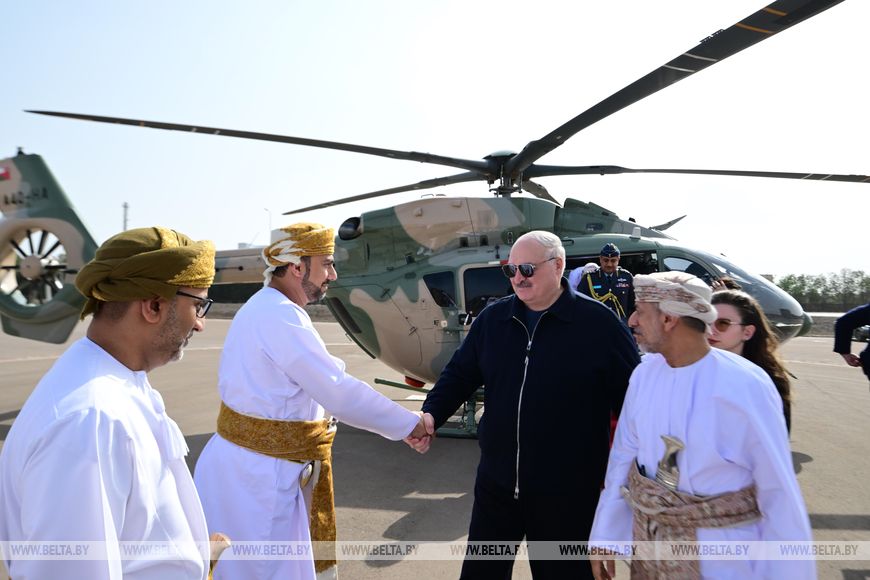
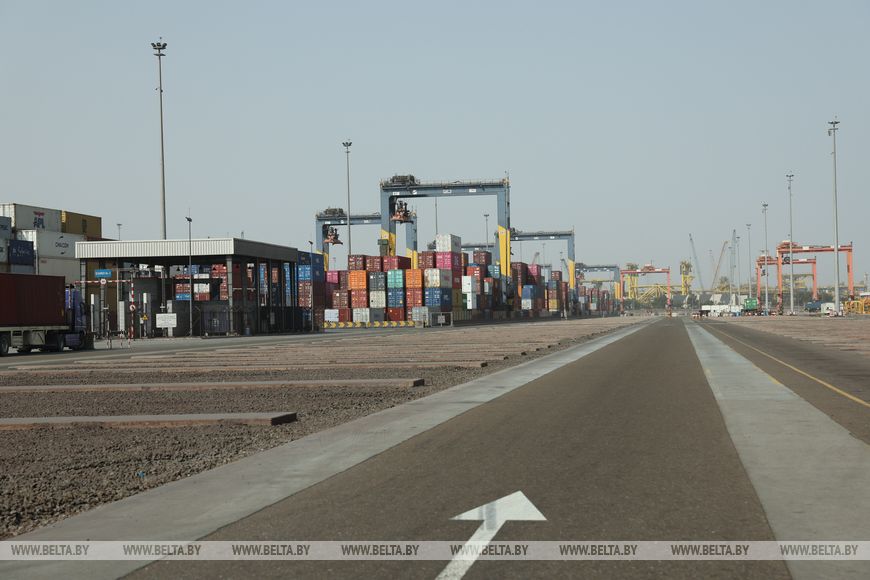
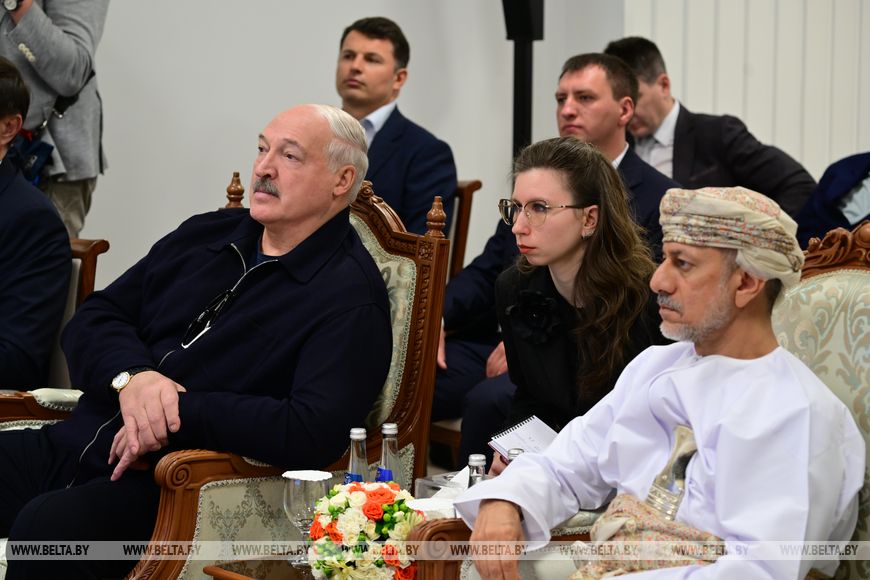
Perhaps you think that Belarus is some distant and little-known country for Oman. Aleksandr Lukashenko's visit to the National Museum of Oman proved the opposite. It turned out that the head of the museum is half Belarusian. His mother is a native of Belarus. The museum is a strategic institution with a special status, directly subordinate to the Sultan. Moreover, the first international exhibition that opened in the museum was dedicated to Belarus.
Let’s tick some boxes. The current industry minister Oman used to work as honorary consul of Belarus in this country. The new honorary consul works in the oil and gas industry. The minister of health of Oman has visited Belarus many times. He is a doctor and came to Belarus to learn the practices at the transplantology center.
What are the prospects for Belarus-Oman cooperation?
Let’s sum up. In fact, Aleksandr Lukashenko is a frequent visitor to Middle East and has great relations with many leaders of the region, including the United Arab Emirates, Qatar, Iran, Pakistan, and Egypt. Developing contacts with Oman was a logical step to build a more active dialogue with the region.
Analyst of the Belarusian Institute for Strategic Research (BISR) Vitaly Romanovsky noted that Minsk's choice in favor of the progressive global majority, to which Oman belongs, is strategic. “We perceive global and regional processes and position ourselves in the international arena in a similar vein,” he said.
The expert noted that the strategic goal of Belarus and Oman is to develop logistics corridors on the continent in order to improve trans-regional transport connectivity and further multilateral economic partnerships.
“Minsk and Muscat attach importance to aligning the logistics potential and production capacities in order to maximize the use of infrastructure to promote various products to foreign markets. For example, Oman traditionally has very close ties with the East African region. In turn, Belarus, while deepening its cooperation with African countries, is interested in exploring the potential of the Omani special economic zones,” Vitaly Romanovsky said.
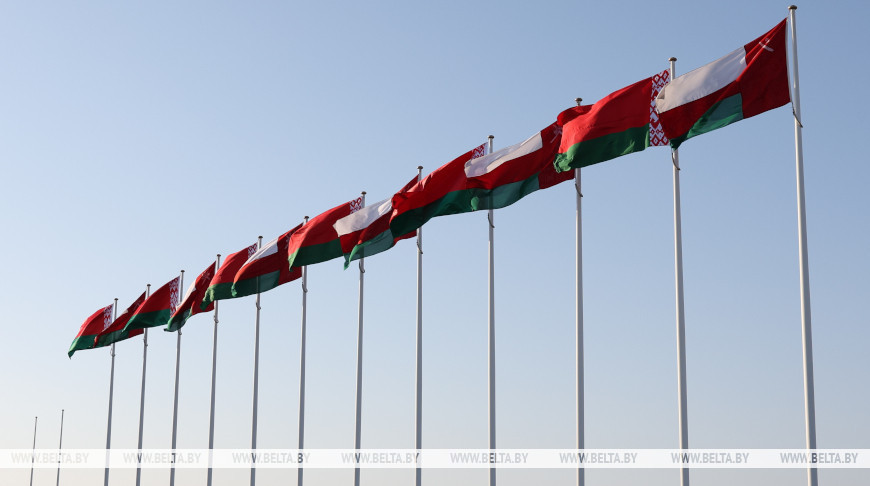
In turn, MP Sergei Rachkov said that Omani business was primarily interested in investing in energy projects, tourism and trade infrastructure, as they are well familiar with these sectors. These may not be the most relevant topics in the Belarusian-Omani relations, so the emphasis can be placed on high technologies, another no less promising sector.
“Cooperation with the HTP is one of the promising avenues. We have created a number of technoparks in Minsk over the past years. We also maintain cooperation in science. think that today cooperation with Oman in science and technology is very promising,” Sergei Rachkov said.
During the presidential visit, the Belarusian ministers signed documents on cooperation with their Omani counterparts and worked out sectoral roadmaps. In addition, the ministers of foreign affairs, industry, food and agriculture held a great deal of consultations and ministerial talks outside the summit meetings.
Minsk and Muscat have many prospects: exports, joint ventures, agriculture, industry, high technology, education, healthcare, and culture. Both parties show readiness for cooperation. The main thing now is to take advantage of this historic opportunity.
When did Belarus begin to develop relations with Oman?
Belarus has long-standing ties with Oman: diplomatic relations between our countries were established more than 30 years ago. Aleksandr Lukashenko made the first visit to Muscat more than 17 years ago
While in 2007 the countries faced the task of creating a solid regulatory framework for the development of trade and economic relations, today Belarus and Oman are thrashing out the strategy and tactics of bilateral cooperation.
Minsk views Muscat as one of the promising trade and investment partners in the Gulf region. This has been facilitated by the intensification of official contacts at the governmental and parliamentary levels over the past two years. Belarus is committed to developing relations with Oman in all areas. All the more so as the states enjoy a high level of trust and sincere friendship.
In 2016 at a meeting with Oman business community Aleksandr Lukashenko noted that the potential of our economic cooperation is huge and will be in demand.
“Belarus is a highly developed country with the economy based on machine building, among other things. In this regard, we are ready to both supply machinery to Oman and set up joint ventures in its territory. Investment cooperation holds a great promise. Belarus has the most favorable conditions for doing business: we guarantee the protection of private property and investments and ensure the right to repatriation of profits. We do not create any obstacles to any mutually beneficial joint projects,” the head of state said.
Sergei Rachkov, Chairman of the Standing Committee on International Affairs of the House of Representatives, former Ambassador to Egypt and concurrently to Oman (2014-2019), said that the Belarus-Oman ties relay on friendly personal relations between the leaders.
“The country is very interesting, beautiful with very nice people. So the cooperation has always had prospects. We have done something already to promote it but there is more to be done,” the MP said.

What is Oman famous for?
What is this country like? At first glance, Oman is like other countries in the region: a monarchy in the form of a sultanate, the largest ethnic group is Arabs, the state religion is Islam. Oman has oil and gas reserves. There are also deposits of copper and iron ores, chromium, coal, manganese, lead, gold and silver.
Oman is also the world’s main supplier of frankincense. The aromatic resin was traded here thousands of years ago. Frankincense was one of the most important commodities in the ancient and medieval times. One of the territories in the country is called the Land of Frankincense.
What is this country like? At first glance, Oman is like other countries in the region: a monarchy in the form of a sultanate, the largest ethnic group is Arabs, the state religion is Islam. Oman has oil and gas reserves. There are also deposits of copper and iron ores, chromium, coal, manganese, lead, gold and silver.
Oman is also the world’s main supplier of frankincense. The aromatic resin was traded here thousands of years ago. Frankincense was one of the most important commodities in the ancient and medieval times. One of the territories in the country is called the Land of Frankincense.
But Omanis have their own distinctive feature - they are a tolerant and peace-loving nation that seeks to build good relations with its neighbors and other countries in the region, which, however, raises a few eyebrows in the region. There is one more important nuance. Although oil, petroleum products and gas make up the vast majority of Oman's exports today, the country has limited reserves of these minerals. Oman is therefore seeking to seriously diversify and modernize its economy. Political elites here realize that, as they say, not by oil alone.




The history of Oman has not been an easy one, with long periods under Western rule. In modern history, the state started to experience real prosperity five decades ago with the rise to power of the former Sultan Qaboos bin Said. It was with him that the Belarusian president held talks during his first visit in 2007. Sultan, who ruled Oman for almost 50 years, died in January 2020. In his condolence message at the time Aleksandr Lukashenko said that Qaboos bin Said had done a lot for Oman and the development of relations with other states, including Belarus.
“The wisdom of this statesman will always be an example for politicians around the world,” said the Belarusian leader.
How was Lukashenko welcomed in Oman?
The president's visit crowned the painstaking year-long work of the Belarusian side in Oman. The visit was preceded by political consultations, a business forum, and a visit of a high-level delegation headed by the minister of antimonopoly regulation and trade, who oversees cooperation with this country. Prime Minister Roman Golovchenko was received in Muscat in October. All this, as we can now see, laid the groundwork for the highest-level visit that sought to cement the agreements already reached and to outline the contours of cooperation in the long term.
Despite the fact that it was a working visit, the welcoming ceremony corresponded to the status of an official or state visit. An honor guard, anthem performance, volleys of artillery guns and other things were meant to show special respect by the host country.
"Overall, although it is a working visit, it feels like an official or even state visit. Following the main day of negotiations, one of the country's main newspapers devoted several front pages to the ongoing visit of the Belarusian president. The frequency of personal contacts of the leaders can be interpreted as a sign of great mutual interest. During the visit, they met several times. Aleksandr Lukashenko told journalists that they discussed strategic issues before zooming in on specific programs and projects. But there are some nuances. For example, negotiations here are usually conducted in a semi-closed format. The press is allowed in for literally a couple of minutes to do some protocol footage. This is a common thing not only for Oman, but also for other countries in the region. On the one hand, money loves silence, and the discussion was centered around trade and economic cooperation. On the other hand, topics like sanctions should be discussed in private,” BelTA’s journalist Vladimir Matveyev shared his impressions.
“The wisdom of this statesman will always be an example for politicians around the world,” said the Belarusian leader.
How was Lukashenko welcomed in Oman?
The president's visit crowned the painstaking year-long work of the Belarusian side in Oman. The visit was preceded by political consultations, a business forum, and a visit of a high-level delegation headed by the minister of antimonopoly regulation and trade, who oversees cooperation with this country. Prime Minister Roman Golovchenko was received in Muscat in October. All this, as we can now see, laid the groundwork for the highest-level visit that sought to cement the agreements already reached and to outline the contours of cooperation in the long term.
Despite the fact that it was a working visit, the welcoming ceremony corresponded to the status of an official or state visit. An honor guard, anthem performance, volleys of artillery guns and other things were meant to show special respect by the host country.
"Overall, although it is a working visit, it feels like an official or even state visit. Following the main day of negotiations, one of the country's main newspapers devoted several front pages to the ongoing visit of the Belarusian president. The frequency of personal contacts of the leaders can be interpreted as a sign of great mutual interest. During the visit, they met several times. Aleksandr Lukashenko told journalists that they discussed strategic issues before zooming in on specific programs and projects. But there are some nuances. For example, negotiations here are usually conducted in a semi-closed format. The press is allowed in for literally a couple of minutes to do some protocol footage. This is a common thing not only for Oman, but also for other countries in the region. On the one hand, money loves silence, and the discussion was centered around trade and economic cooperation. On the other hand, topics like sanctions should be discussed in private,” BelTA’s journalist Vladimir Matveyev shared his impressions.

What is known about Lukashenko's talks with the Sultan of Oman?
The Belarusian ministers, who left the conference hall after the expanded-format talks, did not hide their optimism. Belarusian Minister of Foreign Affairs Maksim Ryzhenkov said that Oman signaled readiness to build long-term relations with Belarus. According to him, Belarus views Oman as a state that has been a trade hub throughout its thousand-year history, a country that has maintained relations with the entire region,

“This is East Africa, neighbor Yemen, as well as India. Therefore, today Belarus counts on Oman's interest in boosting bilateral trade and economic relations, and, most importantly, it would like to use Oman's capacities in order to sell our products further in other markets. All prerequisites are in place for this,” Maksim Ryzhenkov said.
Belarus' Industry Minister Aleksandr Yefimov admitted that the trade between Belarus and Oman is very low. Oman is interested in Belarusian passenger vehicles, trucks, road construction machinery, utility vehicles and agricultural machines.

When the evening set in, the leaders of Belarus and Oman continued their communication and exchanged gifts. Aleksandr Lukashenko presented the Sultan with a Slutsk sash and a Shpagin submachine gun. Long wide sashes with a beautiful pattern and precious threads interwoven into them were first made in the Belarusian lands back in the 16th century. Such a sash indicated the noble origin of its owner and was considered a status symbol.
As for the legendary Shpagin submachine gun, this weapon played a role in the liberation of Belarus from the Nazi invaders and, in general, in winning the Great Patriotic War. The PPSh submachine gun was the main infantry weapon, and soldiers and partisans respectfully called it Papasha.
In turn, the Sultan gifted the Belarusian leader a khanjar, a traditional dagger originating from the Sultanate of Oman. This curved dagger is a mandatory item of traditional Omani Arab costume, and a symbol of the country. One more interesting detail: Aleksandr Lukashenko gave the Sultan a coin in return - there is such a tradition when you accept a cold weapon as a gift.
Why did Lukashenko pen an article to an Omani newspaper?
During his visit to Oman, Aleksandr Lukashenko penned an article laying out what Belarus has on offer for Oman. It is another unusual and very far-sighted move. Although our countries are similar, people in Oman know little about Belarus.
Belarus and Oman do not have profound disagreements; the countries are on the same page on many pressing issues on the global agenda. The peoples of the two countries are close in mentality, although they are separated by thousands of kilometers.
“It is not surprising, the head of state noted, that the two countries share similar views on life and the world. Time has not spared our ancestors, who by the will of fate found themselves on the routes of human settlement in Eurasia and Africa, crossroads of trade and crossroads of civilizations,” the president said.
What did the Sultan of Oman offer Belarus?
During his visit to Oman, Aleksandr Lukashenko had time to talk to Belarusian journalists and tell a little about the agreements reached. According to him, the parties decided to set up an intergovernmental commission and develop a bilateral cooperation map.
“The Sultan has proposed strategic areas of cooperation. It is very important for us to define a point, a port, or maybe we will look at something else, to ship through our technologies, which are needed in Oman. We will use Belarusian technologies to create joint ventures here and move west, east, north from here, from the Indian Ocean, selling our goods. The Sultan has made a very good proposal to create a hub here, a center of Belarusian goods. I told him honestly yesterday that we learned to produce a lot of things but are yet to learn to trade. Meanwhile, Omani people have been involved in commerce since ancient times. They promised to help us in this respect. In short, no topics were off limits,” the president said.
The matter is about re-export. Simply put, Belarus will supply its goods to Oman, and local businesses, having their own interest and assuming certain risks, will sell these goods further. This is a win-win situation. The next step is the setting up of joint manufactures, which is also in the interests of Oman that wants to reduce the economy's dependence on the oil and gas sector. Joint ventures in the food industry can be one of examples here. Possible joint production of vaccines for livestock breeding was also mentioned during the talks.
What is Oman's ‘true gem’?
“There is one thing about Belarus that others respect. We do not pursue some immediate benefit or short-term goals. We seek long-term cooperation; we are ready to exchange technologies,” our colleague Vladimir Matveyev said. “After all, we remember how major Western partners behaved during the pandemic: they simply fenced off and did not supply anything, even medicines and foodstuffs. Oman is interested in strengthening its technological sovereignty and solving food security issues. Belarus is ready to lend a hand here.”
Aleksandr Lukashenko got familiar with Oman's logistics and production capabilities. The president visited the SOHAR Port and Freezone. These facilities are of high importance for developing trade and economic cooperation. The Omani port handles more than 1 million tonnes of sea cargo per week and about 3,500 vessels per year. Since its establishment in 2010, SOHAR Freezone has attracted over $26 billion in investments and has become one of the most successful industrial zones in the Gulf region.
Aleksandr Lukashenko hopes that SOHAR Port and Freezone will become a reliable launching pad for cooperation between Belarus and Oman. “These facilities are true gems of Oman, Al Batinah North Governorate and the new North-South route,” the head of state said.



What brings Belarus and Oman closer together?
Perhaps you think that Belarus is some distant and little-known country for Oman. Aleksandr Lukashenko's visit to the National Museum of Oman proved the opposite. It turned out that the head of the museum is half Belarusian. His mother is a native of Belarus. The museum is a strategic institution with a special status, directly subordinate to the Sultan. Moreover, the first international exhibition that opened in the museum was dedicated to Belarus.
Let’s tick some boxes. The current industry minister Oman used to work as honorary consul of Belarus in this country. The new honorary consul works in the oil and gas industry. The minister of health of Oman has visited Belarus many times. He is a doctor and came to Belarus to learn the practices at the transplantology center.
What are the prospects for Belarus-Oman cooperation?
Let’s sum up. In fact, Aleksandr Lukashenko is a frequent visitor to Middle East and has great relations with many leaders of the region, including the United Arab Emirates, Qatar, Iran, Pakistan, and Egypt. Developing contacts with Oman was a logical step to build a more active dialogue with the region.
Analyst of the Belarusian Institute for Strategic Research (BISR) Vitaly Romanovsky noted that Minsk's choice in favor of the progressive global majority, to which Oman belongs, is strategic. “We perceive global and regional processes and position ourselves in the international arena in a similar vein,” he said.
The expert noted that the strategic goal of Belarus and Oman is to develop logistics corridors on the continent in order to improve trans-regional transport connectivity and further multilateral economic partnerships.
“Minsk and Muscat attach importance to aligning the logistics potential and production capacities in order to maximize the use of infrastructure to promote various products to foreign markets. For example, Oman traditionally has very close ties with the East African region. In turn, Belarus, while deepening its cooperation with African countries, is interested in exploring the potential of the Omani special economic zones,” Vitaly Romanovsky said.

In turn, MP Sergei Rachkov said that Omani business was primarily interested in investing in energy projects, tourism and trade infrastructure, as they are well familiar with these sectors. These may not be the most relevant topics in the Belarusian-Omani relations, so the emphasis can be placed on high technologies, another no less promising sector.
“Cooperation with the HTP is one of the promising avenues. We have created a number of technoparks in Minsk over the past years. We also maintain cooperation in science. think that today cooperation with Oman in science and technology is very promising,” Sergei Rachkov said.
During the presidential visit, the Belarusian ministers signed documents on cooperation with their Omani counterparts and worked out sectoral roadmaps. In addition, the ministers of foreign affairs, industry, food and agriculture held a great deal of consultations and ministerial talks outside the summit meetings.
Minsk and Muscat have many prospects: exports, joint ventures, agriculture, industry, high technology, education, healthcare, and culture. Both parties show readiness for cooperation. The main thing now is to take advantage of this historic opportunity.





